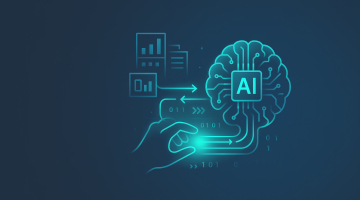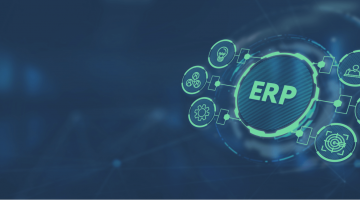
Generative AI in finance: Benefits and challenges
In the increasingly tech-savvy business world, artificial intelligence has become a game-changer for most contemporary verticals. Among various AI technologies (machine learning, natural language processing, large language models, computer vision, etc.) organizations leverage in their pipeline operations, generative artificial intelligence is one of the most wanted ones. Since the launch of ChatGPT by OpenAI, this technology has been experiencing a meteoritic surge: according to Statista, its market size is approaching $63 billion this year and is forecasted to reach $356 billion by 2030, manifesting a mind-blowing CAGR of 41.52%.
The traditionally conservative banking and financial industry is still lacklustre in GenAI tools adoption, accounting for only an almost $2 billion share of this market. Yet, companies in the realm are gradually getting in gear and devising strategies to augment their investments in this know-how, hoping to see the market cross the $15 billion threshold by 2034 with a solid CAGR of 26.3%.
gen AI in financial services
The most forward-looking CEOs in the sector realize the huge potential of generative AI systems that can yield from $200 billion to $340 billion in revenues annually if properly implemented and utilized. So, for businesses in the domain poised for big-time success, embracing generative AI solutions has turned from a welcome option into a vital necessity, propelling a comprehensive operational and finance transformation of their workflows.
This article showcases the perks of employing generative AI innovation by financial institutions, explores shop floor applications where generative AI models bring the most value, and presents the bottlenecks and pitfalls expecting enterprises on the way to their implementation.
The advantages of generative AI in finance
Honed to generate content in large volumes and in various formats (text, audio, video, images, software code), generative AI solutions bring multiple benefits to financial organizations.
Advantages of generative AI in finance
Workflow automation
GenAI tools excel at many tasks the financial pipeline abounds in (for instance, data entry, data analysis, report generation, and more). When performed by human personnel, these assignments take much time, with outcomes containing numerous errors, missed values, and the like. Machines do everything very fast and error-free.
Enhanced efficiency and productivity
With repetitive and mechanical jobs delegated to generative AI tools, employees can focus on more meaningful and creative errands, applying their expertise in the use cases that can’t do without human participation or oversight. The result of smart labor division between humans and machines allows companies to boost their efficiency and achieve more within the working day.
Comprehensive data analysis
For generative AI tools, sifting through vast amounts of data is a cakewalk. They access all available sources containing relevant records, analyze them, identify patterns in the existing data, and deliver customer and market insights to let employees obtain a deep understanding of the domain.
Improved decision-making processes
The GenAI’s power of knowledge management and predictive analytics enables it to generate insights into various aspects of financial institutions’ operations. Armed with them, companies can factor in different possibilities and potential scenarios to facilitate and streamline processes related to adopting data-driven decisions.
Centralized research
Robust generative AI tools take your market intelligence to a new level. Before harnessing them, many organizations suffer from data silos where various departments and teams have no access to external data banks and sources. Having GenAI software in place, a financial company can create a centralized platform that will help employees coordinate their efforts and collaborate on solving complex tasks requiring enterprise-wide involvement.
Long-term cost saving
Initial investment in generative AI software is rather high, but you end up in the black down the line. Large-scale task automation reduces the need for the human workforce (and related expenditures), whereas greater efficiency and augmented productivity contribute to additional profits and a sharper competitive edge over rivals in the niche.
Benchmarking and peer monitoring
To stay ahead of the curve in the field, financial professionals should keep an eye on their competitors. Generative AI solutions serve as valuable tools in your efforts to monitor their performance, notice innovative initiatives, check on new services they offer, watch for products they launch, and compare them against your own releases.
Mitigating security threats
GenAI is a good crutch for strengthening a company’s cyber defenses against penetration attempts and data leakages. Its mechanisms can be configured to keep track of possible threats, create predictive models for potential cyber-attacks, and automate responsive measures to security breaches.
What financial use cases are likely to benefit most from generative AI employment?
Zooming in on generative AI applications in the financial realm
As vetted experts in fintech development, we at DICEUS believe that generative AI tools bring maximum value in the following financial workflows.
Applications of gen AI in finance
Risk management
The financial sphere is a high-risk industry because of dynamic market conditions and wrong-doers’ activities. Generative AI solutions can be instrumental in detecting anomalies symptomatic of potential risks, red-flagging them, and prioritizing according to the degree of gravity to let the personnel responsible for such tasks handle them long before risks become actual threats. Moreover, GenAI mechanisms can model negative future developments and help employees develop guidelines for combating them.
Financial reporting
In the pre-GenAI era, it was a time- and effort-consuming routine that included retrieving data from multiple sources, conducting complex calculations, and crafting digestible summaries. Today, 65% of analysts entrust this long and tedious ordeal to generative AI tools that perform computations, reconciliations, and consolidations with high precision and generate reports automatically. They can produce such error-free and accurate documents both in narrative and numerical format, allowing human personnel to focus on recommendation and strategy development.
Fraud detection
Since fraudsters become ever more inventive in trying to line their pockets at the enterprises’ expense, traditional scam detection and prevention systems may turn out inadequate. Generative AI software can step into the breach and give a hand in this crucial task. It can generate synthetic training data imitating fraud patterns to teach detection algorithms to identify them, monitor transactions in real-time for suspicious activities and anomalies indicative of fraud, and red-flag such instances automatically, alerting employees to take preventive measures.
Financial planning
Given the volatility of the financial realm and rapid changes in consumer demands there, any future-proofing activities have questionable efficiency. Or had until generative AI came into play. Its algorithms can analyze historical data, pinpoint market trends, and generate forecasts and prospective scenarios with a great degree of accuracy, giving professionals clues concerning resource allocation and strategic planning.
Investment and portfolio management
As 25% of decision-makers in the financial sector admit, this is the leading generative AI use case bringing the highest ROI. Its mechanisms are leveraged to analyze the entire complex of customer data (demographics, preferences, objectives, risk tolerance, etc.), get to grips with the existing situation in the investment market, taking into account not only official reports but also social networks and news, and issue personalized investment recommendations that align with the client’s financial goals and exploit potential opportunities for portfolio construction and optimization.
Customer support
Today, round-the-clock, robust, and cost-efficient customer service is impossible without chatbots and virtual assistants. Generative AI empowers them with the ability to comprehend and reproduce human speech, understand message context, and even recognize people’s emotions during interaction. As a result, such systems can answer queries, offer advice, and personalize enterprise-client communication, thus providing the ultimate customer experience and boosting customer satisfaction.
Regulatory compliance
The legal framework in the finance domain imposes stringent rules on data privacy protection and the implementation of anti-money laundering practices. The number of such regulations is so vast (and it is constantly increasing) that keeping track of them is a tall order for companies. Generative AI tools can streamline compliance processes by analyzing shop floor workflows to detect potential issues, continuously monitoring transactions, pinpointing possible violations, and generating regulatory reports where recommended remedial actions are suggested.
While implementing generative AI in these and many other use cases, you should watch for obstacles associated with it.
Generative AI in finance: Challenges and risks to consider
Providing generative AI consulting services, we pay attention to the following roadblocks that may hinder the successful development and onboarding of GenAI software.
Challenges of gen AI in finance
Poor data quality
As data science specialists like to say, garbage in, garbage out. If the input data used for training generative AI models is of low quality, you can’t expect the solution to produce superior results. That is why, to obtain high-quality outcomes, you should pre-process the collected data, ensuring it is relevant, accurate, complete, understandable, and compatible with the specific model you are going to train. And its volume should be sufficient since the greater it is, the more reliable the generated result will be.
Integration issues
Trying to harness cutting-edge generative AI systems, you may find out that your legacy infrastructure doesn’t see eye to eye with them. Naturally, you will have to update and revamp it to be able to enjoy GenAI tools’ transformative potential, but you should be ready for the considerable effort the task will require and take thought for minimizing the disruption to the business pipeline such a process causes.
Investment needs
Onboarding any novel know-how is a big-ticket endeavor, and generative AI is not an exception. In this case, you will have to allocate a significant budget not only for acquiring software and hardware but also to defray extensive energy and computational power consumption. For many organizations, the strain may be excessive, which is why you should perform a preliminary audit of your business needs and direct resources into the use cases, promising the greatest ROI.
Ethical considerations
These come to the forefront with the growth of concerns as to the responsible use of artificial intelligence. Many organizations create positions of AI ethics consultants, whose responsibilities include ensuring the accountability and transparency of AI mechanisms’ operations, providing utmost security of data used by AI systems, mitigating algorithm unfairness and bias in generating synthetic data, and guaranteeing compliance of state-of-the-art tools with industry standards.
Lack of talent
Qualified experts in novel technologies are hard to come by, which conditions the high cost of their services. Of course, you can nurture your own in-house specialists, but training them will take quite a time. Outsourcing is the best approach to address this challenge (and most others, by the way).
While looking for an IT vendor to implement your GenAI project, you should find a reliable company with expertise in custom generative AI development and fintech software creation. DICEUS is your number one choice for such a partner since our software engineers excel at both. We can craft a bespoke generative AI solution that will satisfy all your business and technical requirements, reinventing key workflows of your financial institution and providing maximum customer experience for your clientele.
Experiencing a lack of technical expertise and skills?
Connect with a professional team to address your project challenges.
Key takeaways
Nowadays, generative AI is on a constant rise in multiple industry sectors. The financial domain is warming up to its extensive use across various workflows, including financial planning and reporting, fraud detection, risk management, customer support, regulatory compliance, investment and portfolio management, and more.
When properly implemented by institutions in the realm, generative AI tools enhance workforce efficiency and productivity, automate repetitive tasks, boost data analytics, improve decision-making, centralize research, mitigate security threats, and reduce expenditure in the long run.
To maximize the value of generative AI software in the financial contexts, organizations should address typical challenges of its onboarding (like inadequate training data quality, lack of expertise and investment, ethical issues, integration problems, etc.) and hire a seasoned IT vendor to accomplish a generative AI project up to scratch.
Frequently asked questions
What are the key use cases of generative AI in financial services?
In the financial industry context, generative AI brings maximum value when applied in such workflows as risk assessment and management, financial planning and reporting, fraud detection, investment and portfolio management, customer support, and regulatory compliance.
How does generative AI benefit financial services companies?
By making generative AI solutions core elements of their professional IT infrastructure, financial organizations automate their workflows, increase operational efficiency and productivity, improve data analysis, boost decision-making, eliminate data silos, mitigate security threats, keep track of monitor competitors’ activities, and reduce expenditures in the long run.
How can financial services teams prepare for the integration of generative AI?
To successfully onboard generative AI systems, financial institutions should have a well-thought-out integration strategy in place. It should include such steps as embracing innovation across the organization, creating a universal buy-in among the personnel, identifying and training the workforce for AI adoption, building or buying generative AI software, and running pilot programs on a small scale to test the new tool’s efficiency and prepare for the technology’s smooth implementation.
What impact does generative AI have on data privacy and security in financial services?
Generative AI algorithms are highly instrumental in enhancing the protective defenses of the professional IT infrastructure against penetration attempts and data leakage instances. They can be employed to detect possible cyber threats, craft predictive models that mimic cyber attacks, and automate responsive actions initiated when a security breach occurs.





